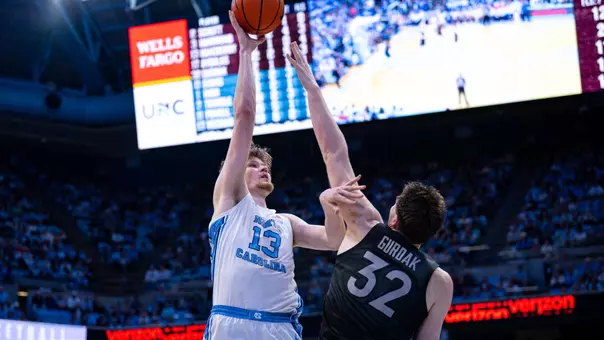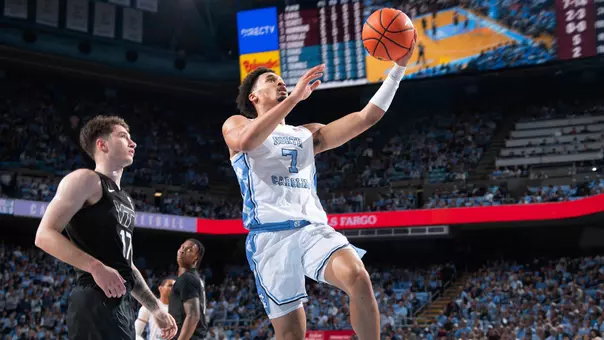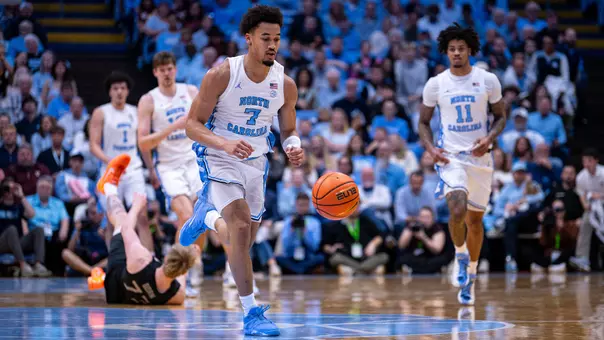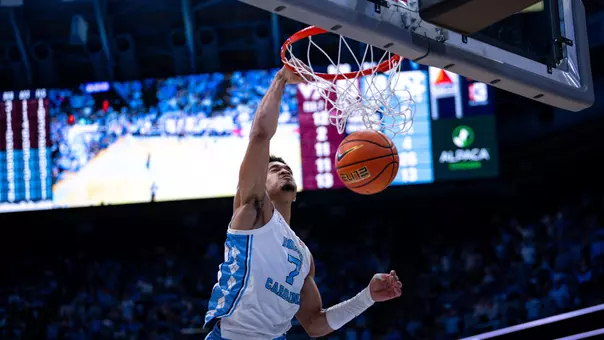University of North Carolina Athletics

Day'Ron Sharpe and Garrison Brooks
Photo by: Grant Halverson
Lucas: One Stop
January 2, 2021 | Men's Basketball, Featured Writers, Adam Lucas
A decisive defensive possession earned Carolina an ACC win.
By Adam Lucas
At almost every single practice, the routine is the same.
At some point, in some drill, Roy Williams will demand his team get one defensive stop. There's an entire drill built around it—stop-score-stop, which requires the Tar Heels to sandwich two stops around one made basket. But even if that drill isn't on a particular day's practice plan, you can be certain the situation will present itself at some point over the course of two hours.
"Get a stop!" Williams will bark. "One stop!"
Which takes us to Saturday afternoon, when Carolina somewhat miraculously held a 66-65 lead over Notre Dame with 9.1 seconds remaining. Day'Ron Sharpe's 25 points had kept the Tar Heels in the game, and then Leaky Black's driving bank shot—the exact type of shot and exact type of play that are the very best option in Black's offensive arsenal—gave Carolina the one-point lead.
"Leaky hit a clutch bucket," Sharpe said. "We went into the timeout saying we need one defensive stop. We work on that every day in practice, working hard on defense and not letting other teams do what they want to do."
Williams called timeout. This was the perfect case study for why Williams saves his timeouts. He'd called one with 28.2 seconds left to set up the final offensive possession. At that stoppage, he chose to put Black, Sharpe, Garrison Brooks, RJ Davis and Kerwin Walton on the court. As of January 2, those are the five players he feels give Carolina the best chance to convert one must-score possession.
During the timeout with 9.1 seconds left, he made a change, subbing senior Andrew Platek for freshman Walton. The rookie had already pumped in four three-pointers, likely solidifying his spot in the starting lineup, but this possession needed situational and defensive awareness, plus some experience—so enter Platek. Depth is only depth if you actually utilize it.
"I'm comfortable playing ten guys," Williams said. "But I'd be a heck of a lot more comfortable if they all played well."
Playing well doesn't always mean making shots. It means playing well in the role you're given. Platek went 0-for-2 from the field against the Irish and played 15 minutes. But he was in the game on the decisive possession, and he played an important role on that play.
As Williams noted, Notre Dame junior guard Prentiss Hubb had been big in the second half. He'd made five of his seven shots and handed out three assists, and he had four of the Irish's last six points at that juncture. Look, you've seen the season. You know what experienced guards can do in a game-winning situation. If Hubb gets that ball...well, you saw the Texas game. Heck, you saw the entirety of last season.
So Black and Platek combined to prevent Hubb from receiving the inbounds pass. That forced Notre Dame to turn to Cormac Ryan to bring the ball up the court, where he eventually was stopped by Davis. That forced him to find Juwan Durham for a midrange jumper; at that point in the game, Durham was probably the third- or fourth-most desirable offensive option for Mike Brey, especially at that spot on the floor. As Sharpe said, Carolina had prevented Notre Dame from doing what they ideally might have wanted to do. Durham can make that shot. But the degree of difficulty with Sharpe flying at him was very high. If the opponent has to take a potential game-winning shot, it was a palatable option from a Carolina perspective.
It was five players defending together, and it was a textbook stop. In what was not a pretty game, and in what certainly highlighted some areas where Carolina needs to improve—the Tar Heels have to get better playmaking, must play at a faster tempo and still need to get better defensively—it was a much-needed victory.
Carolina is 6-4, an unfamiliar record in January. But remember this year's shortened schedule had very few soft spots. Add in two or three of the lesser opponents that would normally have been on the November and December schedule, and you're looking at a much more palatable record.
A quick word of thanks, then, to the Atlantic Coast Conference. Instead of forcing the Tar Heels to stew on Wednesday night's loss at Georgia Tech, as had been originally scheduled, the league abruptly decided on Thursday afternoon to send Notre Dame to Chapel Hill. Very, very few coaches in the league would have agreed to such short notice—Williams and Brey are two who would.
We'll have to see how the upcoming weeks take shape, but it feels like Saturday's win was important. "We were hyped to play this game," Sharpe said. "It was very good to get back on the court sooner than we thought we would." Without the scheduling change, the opportunity to get a win before traveling to Miami next week wouldn't have happened.
On Saturday, one stop turned into one win. Now the Tar Heels have to see if they can turn it into even more.
At almost every single practice, the routine is the same.
At some point, in some drill, Roy Williams will demand his team get one defensive stop. There's an entire drill built around it—stop-score-stop, which requires the Tar Heels to sandwich two stops around one made basket. But even if that drill isn't on a particular day's practice plan, you can be certain the situation will present itself at some point over the course of two hours.
"Get a stop!" Williams will bark. "One stop!"
Which takes us to Saturday afternoon, when Carolina somewhat miraculously held a 66-65 lead over Notre Dame with 9.1 seconds remaining. Day'Ron Sharpe's 25 points had kept the Tar Heels in the game, and then Leaky Black's driving bank shot—the exact type of shot and exact type of play that are the very best option in Black's offensive arsenal—gave Carolina the one-point lead.
"Leaky hit a clutch bucket," Sharpe said. "We went into the timeout saying we need one defensive stop. We work on that every day in practice, working hard on defense and not letting other teams do what they want to do."
Williams called timeout. This was the perfect case study for why Williams saves his timeouts. He'd called one with 28.2 seconds left to set up the final offensive possession. At that stoppage, he chose to put Black, Sharpe, Garrison Brooks, RJ Davis and Kerwin Walton on the court. As of January 2, those are the five players he feels give Carolina the best chance to convert one must-score possession.
During the timeout with 9.1 seconds left, he made a change, subbing senior Andrew Platek for freshman Walton. The rookie had already pumped in four three-pointers, likely solidifying his spot in the starting lineup, but this possession needed situational and defensive awareness, plus some experience—so enter Platek. Depth is only depth if you actually utilize it.
"I'm comfortable playing ten guys," Williams said. "But I'd be a heck of a lot more comfortable if they all played well."
Playing well doesn't always mean making shots. It means playing well in the role you're given. Platek went 0-for-2 from the field against the Irish and played 15 minutes. But he was in the game on the decisive possession, and he played an important role on that play.
As Williams noted, Notre Dame junior guard Prentiss Hubb had been big in the second half. He'd made five of his seven shots and handed out three assists, and he had four of the Irish's last six points at that juncture. Look, you've seen the season. You know what experienced guards can do in a game-winning situation. If Hubb gets that ball...well, you saw the Texas game. Heck, you saw the entirety of last season.
So Black and Platek combined to prevent Hubb from receiving the inbounds pass. That forced Notre Dame to turn to Cormac Ryan to bring the ball up the court, where he eventually was stopped by Davis. That forced him to find Juwan Durham for a midrange jumper; at that point in the game, Durham was probably the third- or fourth-most desirable offensive option for Mike Brey, especially at that spot on the floor. As Sharpe said, Carolina had prevented Notre Dame from doing what they ideally might have wanted to do. Durham can make that shot. But the degree of difficulty with Sharpe flying at him was very high. If the opponent has to take a potential game-winning shot, it was a palatable option from a Carolina perspective.
It was five players defending together, and it was a textbook stop. In what was not a pretty game, and in what certainly highlighted some areas where Carolina needs to improve—the Tar Heels have to get better playmaking, must play at a faster tempo and still need to get better defensively—it was a much-needed victory.
Carolina is 6-4, an unfamiliar record in January. But remember this year's shortened schedule had very few soft spots. Add in two or three of the lesser opponents that would normally have been on the November and December schedule, and you're looking at a much more palatable record.
A quick word of thanks, then, to the Atlantic Coast Conference. Instead of forcing the Tar Heels to stew on Wednesday night's loss at Georgia Tech, as had been originally scheduled, the league abruptly decided on Thursday afternoon to send Notre Dame to Chapel Hill. Very, very few coaches in the league would have agreed to such short notice—Williams and Brey are two who would.
We'll have to see how the upcoming weeks take shape, but it feels like Saturday's win was important. "We were hyped to play this game," Sharpe said. "It was very good to get back on the court sooner than we thought we would." Without the scheduling change, the opportunity to get a win before traveling to Miami next week wouldn't have happened.
On Saturday, one stop turned into one win. Now the Tar Heels have to see if they can turn it into even more.
Players Mentioned
2026 Tar Heel Trailblazer On-Court Recognition: Martina Ballen
Monday, March 02
2026 Tar Heel Trailblazer On-Court Recognition: Hubert West
Monday, March 02
Honoring the 2026 Tar Heel Trailblazers - Martina Ballen & Hubert West
Monday, March 02
UNC Baseball: Tar Heels Complete Sweep of Le Moyne with 21-1 Win in Game 3
Sunday, March 01



















